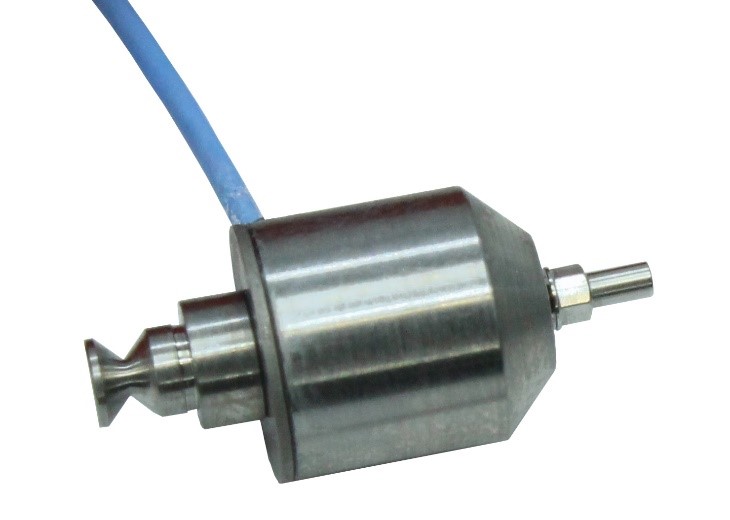
What are the advantages of the Alemnis mini load cell (MLC)?
The mini load cell (MLC) is a specialized device used to measure force or load. Its design and functionality are centered around precision and sensitivity, particularly in dynamically demanding applications. The “mini” aspect refers to its size compared to the Alemnis Standard Load Cell (SLC) making it suitable for applications where space is limited.
Working Principles of the Mini Load Cell
The Mini load cell ismeticulously designed to ensure precision and durability. The design of MLCs is intentionally compact lightweight and extremely stiff, facilitating their integration into various testing setups, especially where space is at a premium or when dealing with dynamic testing conditions.
At the heart of a mini load cell lies its critical component: the sensing element, which is usually a strain gauge. This gauge is a fine, conductive material that deforms slightly when subjected to a force. This deformation is crucial for the MLC’s function, as it is the primary data source for measuring the force. The strain gauge’s design and material composition are carefully calibrated to ensure responsiveness and accuracy in force detection.
The operation of an MLC revolves around the principle of deformation and electrical resistance. When a force is applied to the MLC, it causes the strain gauge to deform. This deformation, even though minute, results in a change in the electrical resistance of the gauge. This change is directly proportional to the magnitude of the force applied. The altered electrical resistance is then translated into an electrical signal through the MLC’s circuitry. This signal can be precisely measured and interpreted, clearly and accurately determining the force’s magnitude. The MLC’s ability to convert mechanical deformation into an electrical signal allows for high precision and reliability in force measurement, making it a vital tool in various scientific and engineering applications.
Features of Mini Load Cells
- High Precision and Sensitivity: MLCs can measure very small forcesin the micro-newton (µN) range. This high sensitivity makes them ideal for testing materials where slight variations in force can have significant effects.
- Dynamic Range: The Alemnis MLC works in an exterme range of forces from µN up to 4 N, which makes it ideally suited for testing comparably large structures or hard materials
- Small Size: The compact nature of MLCs allows them to be used in confined spaces and integrated into systems where larger load cells cannot fit.
- Versatility: They can be used in various applications, from biomechanical research to materials engineering. Their design allows for adaptations, such as different ranges of force measurement, to suit specific requirements.
- Robustness: Despite their small size, MLCs are durable and can withstand challenging environments, including changes in temperature, humidity, and exposure to chemicals.
Enhanced Precision and Sensitivity
Our mini load cells are engineered to provide exceptionally high precision in load measurement. With an applied load range starting from as low as 10 µN, these sensors can detect minute forces that are often critical in studying micro-scale materials. This high sensitivity is particularly beneficial for research in nanotechnology and microfabrication, where accurate force measurement is paramount.
Adaptability to Varied Testing Conditions
Combining MLCs with our Relative Humidity Module (RHM) allows tests to be conducted in highly controlled environmental conditions. This feature is crucial for experiments where relative humidity and temperature significantly impact material properties. It also facilitates testing in submerged conditions, broadening the scope of materials that can be studied, including hydrogels and biomaterials in simulated physiological environments.
Extended Load Range Flexibility
The standard load range of our MLCs, extending to 500 mN, can be expanded to 4 N by opting for alternative load sensors. This extended range is vital for a broader spectrum of material testing, encompassing everything from soft tissues to harder, more resilient materials. Such flexibility ensures that MLCs are confined to delicate materials and applicable in studying structural components.
Diverse Application Spectrum
The application range of mini load cells is remarkably diverse. In the realm of biomaterials, they are instrumental in understanding the mechanical properties of tissues and cellular structures. For micropillars and particles, MLCs facilitate the study of mechanical behavior under compression and tension. In gel testing, they allow for the examination of viscoelastic properties. Furthermore, their utility in tensile testing under various environmental conditions opens new avenues in material science research.
Advanced Data Acquisition and Analysis
Beyond physical versatility, MLCs by Alemnis are equipped with sophisticated data acquisition systems. This feature enables researchers to gather detailed, accurate data, which is crucial for advanced material analysis and modeling. The ability to accurately record and analyze load data paves the way for breakthroughs in understanding material behaviour under different stress conditions.
Elevate Your Material Testing Precision with Mini Load Cells
Are you looking to enhance the accuracy and scope of your material testing? Our mini load cells are engineered to deliver unmatched precision and adaptability in various testing environments. Explore our selection of standard and specialized MLCs to transform your material testing capabilities. Reach out to us now to discover more about how our load sensors can redefine precision in your testing processes.


